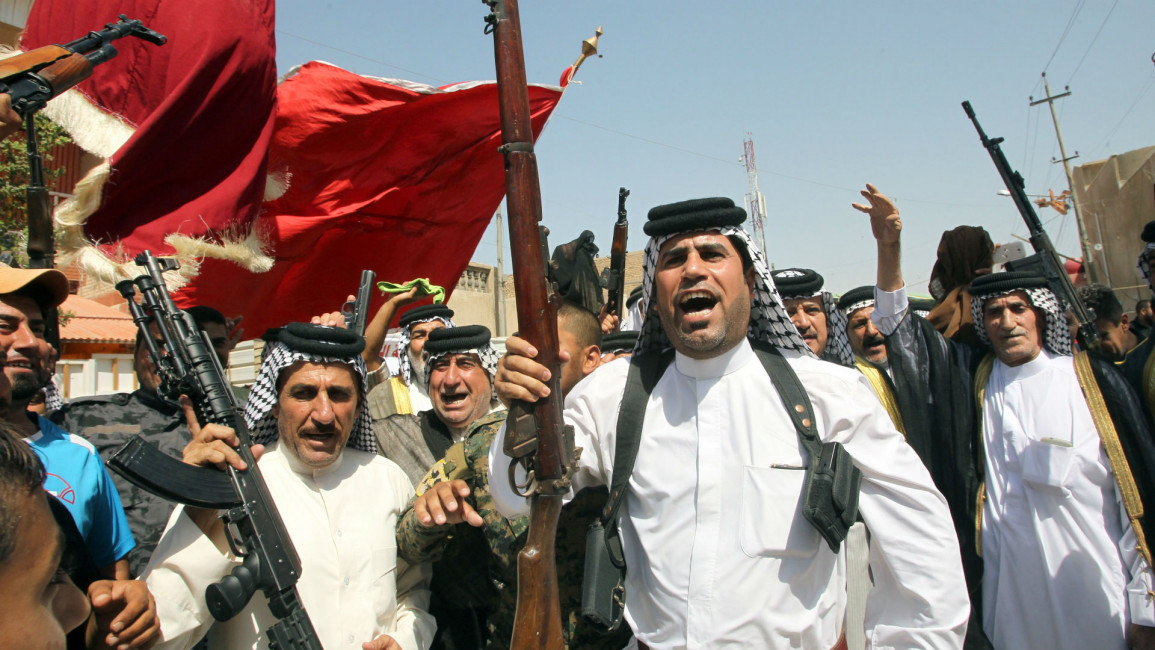IS kills 70 Sunni tribesmen in Iraq's Anbar
IS kills 70 Sunni tribesmen in Iraq's Anbar
Islamic state has killed at least 70 pro-government Sunni tribesmen in Anbar province in western Iraq where the military is battling to re-capture territories controlled by the militants.
3 min read
The Albu Nimr tribe was very active in the Awakening Councils [Getty]
IS militants executed 70 members of a Sunni tribe allied to the government in western Iraq earlier this week, a tribal leader and the UN said on Wednesday.
The victims, members of the Albu Nimr tribe, were executed on Sunday in the Tharthar area north of Ramadi, the capital of the western Anbar province, tribal elder Naim Gaoud told AFP.
"These people who were executed were the fathers and brothers of members of the police, the army and of tribal fighters who are battling IS," he said.
"IS executed them by shooting," he said.
Iraqi security forces, backed by US-led coalition air strikes, launched a vast operation west of Ramadi on Sunday to tighten the noose on IS, which captured the Anbar capital in May and controls most of the province.
Hatem al-Gaoud, another clan member reached by phone, said IS had trapped dozens of tribe members in the Khanzir area of Tharthar since the jihadist group launched its major offensive in Iraq last year.
"They gathered them outside Khanzir and shot them all in the head," he said.
"I don't know what IS did with the bodies, but it is likely they buried them in mass graves near the site of the execution," he said.
The UN Mission in Iraq's human rights office confirmed the mass execution.
"This is not the first attack on the Albu Nimr, since they have been actively opposed to IS," it said in an email to AFP.
Possibly as many as 300 of the tribe's members were killed around a year ago, when anti-IS forces were still holding out in some parts of Ramadi, which is the Albu Nimr's main hub.
The tribe was very active in the Awakening Councils, groups of Sunni tribal fighters the US military paid and armed a decade ago to fight against IS' previous incarnation in Iraq.
Local tribal fighters are seen by the US as a key component of any successful effort to retake control of Anbar and other Sunni regions of Iraq, which IS took over virtually unopposed last year.
They no longer receive direct support from the US, whose assistance is channelled through the Shia-dominated federal government.
IS has massacred hundreds of former Awakening fighters in an effort to intimidate Sunni residents from taking up arms against them.
Britain's Minister for the Middle East, Tobias Ellwood, said in a statement he was "deeply concerned and shocked" by reports of the Anbar executions.
"We have been clear, defeating ISIL (IS) will take time and patience but it is a fight we must win. They falsely use the name of Islam to commit atrocities and have once again slaughtered Sunnis, those they claim to be defending," he said.
The victims, members of the Albu Nimr tribe, were executed on Sunday in the Tharthar area north of Ramadi, the capital of the western Anbar province, tribal elder Naim Gaoud told AFP.
"These people who were executed were the fathers and brothers of members of the police, the army and of tribal fighters who are battling IS," he said.
"IS executed them by shooting," he said.
| They gathered them outside Khanzir and shot them all in the head - Hatem al-Gaoud |
Hatem al-Gaoud, another clan member reached by phone, said IS had trapped dozens of tribe members in the Khanzir area of Tharthar since the jihadist group launched its major offensive in Iraq last year.
"They gathered them outside Khanzir and shot them all in the head," he said.
"I don't know what IS did with the bodies, but it is likely they buried them in mass graves near the site of the execution," he said.
The UN Mission in Iraq's human rights office confirmed the mass execution.
"This is not the first attack on the Albu Nimr, since they have been actively opposed to IS," it said in an email to AFP.
Possibly as many as 300 of the tribe's members were killed around a year ago, when anti-IS forces were still holding out in some parts of Ramadi, which is the Albu Nimr's main hub.
The tribe was very active in the Awakening Councils, groups of Sunni tribal fighters the US military paid and armed a decade ago to fight against IS' previous incarnation in Iraq.
Local tribal fighters are seen by the US as a key component of any successful effort to retake control of Anbar and other Sunni regions of Iraq, which IS took over virtually unopposed last year.
They no longer receive direct support from the US, whose assistance is channelled through the Shia-dominated federal government.
IS has massacred hundreds of former Awakening fighters in an effort to intimidate Sunni residents from taking up arms against them.
Britain's Minister for the Middle East, Tobias Ellwood, said in a statement he was "deeply concerned and shocked" by reports of the Anbar executions.
"We have been clear, defeating ISIL (IS) will take time and patience but it is a fight we must win. They falsely use the name of Islam to commit atrocities and have once again slaughtered Sunnis, those they claim to be defending," he said.



